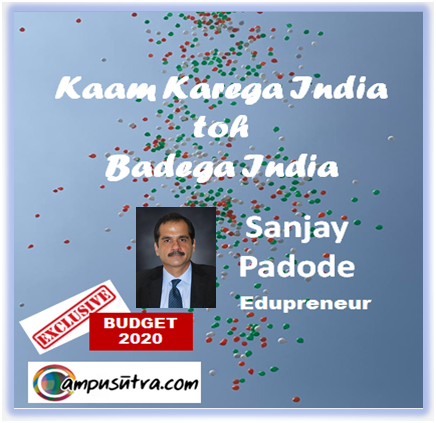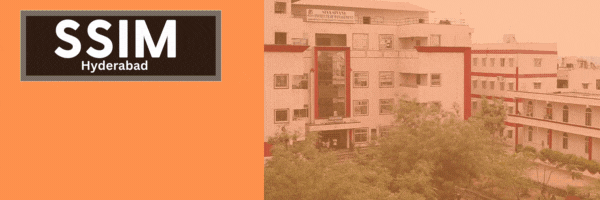- For the skill development ministry and its various programmes, an allocation of INR 3,002.21 crore has been proposed for FY21 compared to INR 2,531.04 crore in FY20.
-
the department of higher education has been allocated INR 39,466.52 crore while the school education and literacy department was given INR 59,845 crore.
-
For the skill development ministry and its various programmes, an allocation of INR 3,002.21 crore has been proposed for FY21 compared to Rs 2,531.04 crore in FY20.
Here are my prima facie analysis of the budget especially for education
 “Kaam karega India toh Badega India” seems to be underlying objective of the apprenticeship schemes and internships in local urban bodies. The internship and apprenticeship model is surely going to enhance the much needed employability of the graduating work force.
“Kaam karega India toh Badega India” seems to be underlying objective of the apprenticeship schemes and internships in local urban bodies. The internship and apprenticeship model is surely going to enhance the much needed employability of the graduating work force.
The use of District Hospitals for development of medical schools in the PPP model will address the scarcity of Doctors and dilute the stronghold of the existing private medical colleges and in turn reduce the outflow of foreign exchange to medical schools established in our neighbouring countries. Permitting established hospitals to offer PG courses will rationalise the Tuition fee being charged for such courses by medical schools. These should make India healthier.
The external commercial borrowings and foreign direct investment should also augment the funding required by the starved education sector. Rs 99300 crore is not enough to bring in the change but the same can be compensated by FDI and ECB provided the policy to draw on such funding is provided to all in a fair and transparent manner.
Permitting under 100 NIRF ranked institutions to offer online course can significantly dilute the present pressure on the GER and also help many to re skill on the go.
Study in India can be given immense boost through ECB and FDI. More Asian and African students in India will surely boost the image of India as an international destination for education and has the potential of making  Educational services as one of the prime drivers of the service economy.
Educational services as one of the prime drivers of the service economy.
 Boost to start ups will enhance employment opportunities and also build aspirations in the youth of our country. This should create more inspiring stories such as Flipkart, Ola and Oyo. Thereby raising the hope amongst the youth to attain unimaginable success in their lifetime by pursuing education.
Boost to start ups will enhance employment opportunities and also build aspirations in the youth of our country. This should create more inspiring stories such as Flipkart, Ola and Oyo. Thereby raising the hope amongst the youth to attain unimaginable success in their lifetime by pursuing education.
The tax reduction will help the middle class in investing more in re-skilling and education.
All this coupled with the due National Education Policy can multiply the demographics dividend 10X for our country.
Mr. Sanjay Padode. Secretary – CDE Society, Bangalore
 Not seen the budget proposal yet! But you can cover/ develop contents around: Quality of higher education is directly
Not seen the budget proposal yet! But you can cover/ develop contents around: Quality of higher education is directly  related/proportional to the level of economy in a nation! This can be seen today with US, EU countries, China, ancient India, Africa, the Singapore then and now, etc. as illustrative examples. Thus, if higher education in India does not measure up to the demands of a higher economy in terms of quality, then irrespective of the projected investments to attain $5T economy, this dream may not be sustainable if achieved, or it may become a pipe-dream!! Hence, a major reform in higher education on the lines of economic liberalisation of 1991, is a must now!!
related/proportional to the level of economy in a nation! This can be seen today with US, EU countries, China, ancient India, Africa, the Singapore then and now, etc. as illustrative examples. Thus, if higher education in India does not measure up to the demands of a higher economy in terms of quality, then irrespective of the projected investments to attain $5T economy, this dream may not be sustainable if achieved, or it may become a pipe-dream!! Hence, a major reform in higher education on the lines of economic liberalisation of 1991, is a must now!!
Prof. Jitendra K. Das, Director, FORE School of Management
In the Union budget for education there is no substantial allocation. Without having an analysis  of the impact of
of the impact of  the spending done on skill development in the last budget allocating another three thousand crore does not give confidence to stakeholders. Degree level Online education is given to 100 top NIRF ranked institutions, which is in itself a good move. But what is done to improve the quality of education in the non-online mode. In the same line, instead improving and enhancing the quality of the degree and diploma level course why there is apprenticeship attached to it. That means what is taught in three year course is not practical. Hope the new educational has some directions for all these deficiencies.
the spending done on skill development in the last budget allocating another three thousand crore does not give confidence to stakeholders. Degree level Online education is given to 100 top NIRF ranked institutions, which is in itself a good move. But what is done to improve the quality of education in the non-online mode. In the same line, instead improving and enhancing the quality of the degree and diploma level course why there is apprenticeship attached to it. That means what is taught in three year course is not practical. Hope the new educational has some directions for all these deficiencies.
Dr Joe Arun, SJ Director, LIBA





